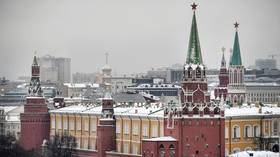Kremlin responds to Chinese bank claims

The issue of compliance with US sanctions by Chinese banks falls outside the purview of the Kremlin, presidential spokesman Dmitry Peskov told reporters on Tuesday.
He declined to comment on a Bloomberg report that claimed that Chinese state-owned banks are tightening restrictions on servicing Russian clients for fears of secondary sanctions from Washington, noting that it is “a highly sensitive topic and it is unlikely that anyone will undertake talking about it.”
“The Kremlin does not engage in financial transactions. This is the matter of other departments and, first of all, those companies involved in foreign economic activity. In each case, separate channels and separate systems are implemented,” Peskov told Kommersant FM radio station.
“We continue to develop relations with China; it’s a very important strategic partner for us,” he added.
According to Peskov, the two countries’ strong economic cooperation was reflected in the higher-than-expected volume of bilateral trade, which hit $240 billion last year and continues to grow.
Bloomberg reported earlier on Monday that at least two Chinese state-owned banks were tightening controls on servicing Russian clients following Washington’s approval of secondary sanctions on financial institutions found aiding Russia’s military-industrial complex.
Last month, US President Joe Biden signed an executive order authorizing secondary sanctions targeting foreign banks that are found to be enabling deals involving goods that “end up on the battlefield” or related to Russia’s defense sector.
Possible dual-purpose goods that banks should avoid reportedly include semiconductors, machine tools, chemical precursors, ball bearings, and optical systems.
For more stories on economy & finance visit RT's business section













